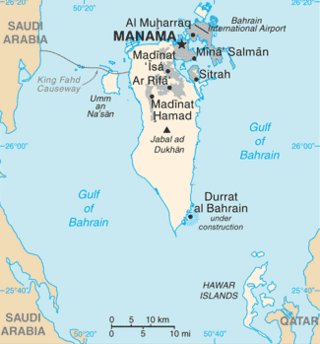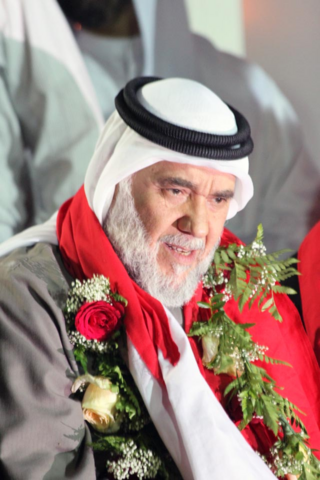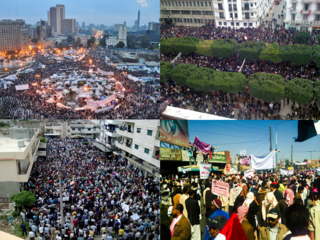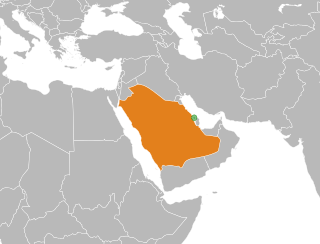This is a list of wars involving the Kingdom of Bahrain and its predecessor states.
An intifada is a rebellion or uprising, or a resistance movement. It is a key concept in contemporary Arabic usage referring to a uprising against oppression. In the Israeli-Palestinian conflict context, it refers to violent or non-violent uprising or opposition by the Palestinian people to the Israeli occupation.

Manama is the capital and largest city of Bahrain, with an approximate population of 200,000 as of 2020. Long an important trading center in the Persian Gulf, Manama is home to a very diverse population. After periods of Portuguese and Persian control and a short invasion from the ruling dynasty of Saudi Arabia, followed by a longer invasion by Oman, Bahrain established itself as an independent nation in 1971 following a period of British hegemony.
Bahrain was a central location of the ancient Dilmun civilization. Bahrain's strategic location in the Persian Gulf has brought rule and influence from mostly the Persians, Sumerians, Assyrians, Babylonians, Portuguese, the Arabs, and the British.
Ian Stuart McWalter Henderson, also known as Ian Stewart McWalter Henderson, was a British citizen known for his role in resolving the Mau Mau crisis in Kenya in the late 1950s and for managing the Bahraini General Directorate for State Security Investigations from 1966 to 1998. Henderson was dubbed the "Butcher of Bahrain" due to torture and the numerous human rights violations that were alleged to have taken place under his command there, especially during 1990s uprising in Bahrain.

Ali Salman Ahmed Salman is a Bahraini Twelver Shi'a cleric and the Secretary-General of the Al-Wefaq political society. In January 1995, the Bahraini government forcibly exiled him to Dubai for leading a popular campaign demanding the reinstatement of the constitution and the restoration of parliament during the 1990s Uprising. From there he made his way to London and sought asylum. He continued opposition activities from London, where he was associated with the Bahrain Freedom Movement. Salman returned to Bahrain in March 2001 in a general amnesty as part of a set of political reforms announced by King Hamad.

The Islamic Front for the Liberation of Bahrain was a Shi'a Islamist militant group that advocated theocratic rule in Bahrain from 1981 to the 1990s. It was based in Iran and trained and financed by Iranian intelligence and Revolutionary Guards.

The Bahrain Freedom Movement is a London-based Bahraini opposition group which has its headquarters in a north London mosque. Its main medium is the Voice of Bahrain website which was blocked for several years by Batelco, Bahrain's sole Internet service provider, on orders from the Ministry of Information.

The 1990s uprising in Bahrain also known as the uprising of dignity was an uprising in Bahrain between 1994 and 1999 in which leftists, liberals and Islamists joined forces to demand democratic reforms. The uprising caused approximately forty deaths and ended after Hamad bin Isa Al Khalifa became the Emir of Bahrain in 1999 and a referendum on 14–15 February 2001 massively supported the National Action Charter. The uprising resulted in the deaths of around 40 civilians and at least one Bahraini soldier.

Hasan Mushaima is an opposition leader in Bahrain and the secretary-general of the Haq Movement, an important opposition party in Bahrain. Before forming Haq, he was a founding member of Al Wefaq and a leading figure in the 1994 uprising in Bahrain. He has campaigned for more democratic rights in Bahrain and has been in prison in Bahrain since his arrest in 2011.
The March Intifada was an uprising that broke out in Bahrain in March 1965. The uprising was led by Leftist groups, the National Liberation Front – Bahrain calling for the end of the British presence in Bahrain and numerous notable individuals participated in the uprising, including Wa'ad political activist Ali Rabea. The uprising was sparked by the laying-off of hundreds of Bahraini workers at the Bahrain Petroleum Company on March 5, 1965. Several people died in the sometimes violent clashes between protesters and police.

Bahrain, officially the Kingdom of Bahrain, is an island country in West Asia. It is situated on the Persian Gulf, and comprises a small archipelago made up of 50 natural islands and an additional 33 artificial islands, centered on Bahrain Island which makes up around 83 per cent of the country's landmass. Bahrain is situated between Qatar and the northeastern coast of Saudi Arabia, to which it is connected by the King Fahd Causeway. The population of Bahrain is 1,501,635 as of May 14, 2023, based on elaborations of the United Nations data, of whom 712,362 are Bahraini nationals. Bahrain spans some 760 square kilometres (290 sq mi), and is the third-smallest nation in Asia after the Maldives and Singapore. The capital and largest city is Manama.

The Arab Spring or the First Arab Spring was a series of anti-government protests, uprisings and armed rebellions that spread across much of the Arab world in the early 2010s. It began in Tunisia in response to corruption and economic stagnation. From Tunisia, the protests then spread to five other countries: Libya, Egypt, Yemen, Syria and Bahrain. Rulers were deposed or major uprisings and social violence occurred including riots, civil wars, or insurgencies. Sustained street demonstrations took place in Morocco, Iraq, Algeria, Lebanon, Jordan, Kuwait, Oman and Sudan. Minor protests took place in Djibouti, Mauritania, Palestine, Saudi Arabia and the Moroccan-occupied Western Sahara. A major slogan of the demonstrators in the Arab world is ash-shaʻb yurīd isqāṭ an-niẓām!.

The 2011Bahraini uprising was a series of anti-government protests in Bahrain led by the Shia-dominant and some Sunni minority Bahraini opposition from 2011 until 2014. The protests were inspired by the unrest of the 2011 Arab Spring and protests in Tunisia and Egypt and escalated to daily clashes after the Bahraini government repressed the revolt with the support of the Gulf Cooperation Council and Peninsula Shield Force. The Bahraini protests were a series of demonstrations, amounting to a sustained campaign of non-violent civil disobedience and some violent resistance in the Persian Gulf country of Bahrain. As part of the revolutionary wave of protests in the Middle East and North Africa following the self-immolation of Mohamed Bouazizi in Tunisia, the Bahraini protests were initially aimed at achieving greater political freedom and equality for the 70% Shia population.
Coalition Youth of 14 Feb Revolution, sometimes called The Coalition is a Bahraini youth group, named after the date of the beginning of Bahrain's uprising, and led by anonymous individuals who organize protests chiefly via new-media sites. The Coalition first appeared on the popular pro-democracy forum Bahrain Online. Their Facebook page started in April 2011 where they have 65,282 likes. It is the main Facebook page that calls for daily peaceful demonstrations and protests. One of the first sub-groups called February 14 Youth was behind the call for demonstrations on February 14, 2011, named "Day of Rage" and developed later to a nationwide uprising. in 2017, the group has been designated as a terrorist organization by Bahrain, Saudi Arabia, United Arab Emirates and Egypt.

Relations exist between Bahrain and Saudi Arabia. Relations between the two are close and friendly.
The background of the Bahraini uprising dates back to the beginning of the twentieth century. The Bahraini people have protested sporadically throughout the last decades demanding social, economic and political rights. Demonstrations were present as early as the 1920s and the first municipal election was held in 1926. Ruled by Al Khalifas since 1783, Bahrain was a British protectorate for most of the twentieth century. The National Union Committee (NUC) formed in 1954 was the earliest serious challenge to the status quo. Two year after its formation, NUC leaders were imprisoned and deported by authorities.
Shahrakan is a village situated in the western side of the Kingdom of Bahrain, south of the village of Malkiya. The village lies in the Northern Governorate administrative region. It has a population of approximately 3,000 people.

The Saudi–led intervention in Bahrain began on 14 March 2011 to assist the Bahraini government in suppressing an anti-government uprising in the country. The intervention came three weeks after the U.S. pressured Bahrain to withdraw its military forces from the streets. As a decision by Gulf Cooperation Council (GCC), the intervention included sending 1,000 (1,200) troops with vehicles from Saudi Arabia at the invitation of the Al-Khalifa ruling family, marking the first time the GCC used such a collective military option for suppressing a revolt.
The insurgency in Bahrain is an ongoing insurgency by militant groups, part of the Bahraini Opposition, supported by Iran, to topple government of Bahrain.